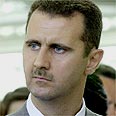
Bashar Assad
צילום איי פי
Syrian President Bashar Assad
None
Had it not been for his brother's death in a car accident, Syrian President Bashar Assad would probably be practicing ophthalmology in London.
In 1994, devastated by the accidental death of his oldest son Basil, whom he had groomed as his successor, the late President Hafez Assad pressed Bashar to abandon his career in medicine in the English capital to prepare for the presidency.
Bashar was put on a fast-track military course and in 1999 he was promoted to the rank of colonel.
President Assad feared that his second son's lack of experience would spell the end of his Baath Party's 30-year grip on power. Stricken by heart disease, Assad sidelined his competitors within Baath and arranged for Bashar to play an increasingly important role in running the country.
Bashar cut his teeth on Lebanon where his father had imposed Syrian hegemony.
Despite fears of unrest following Assad's death, the presidency was smoothly transferred to Bashar in June 2000.
Six months later, Bashar married Asma (Amah) Akhras, a British-born Syrian-Sunni computer systems analyst. A year later, their first son was born and named Hafez.
In his first speech to parliament, Bashar told legislators: "Democracy is the basis for everything, but it is not proper to apply the democracy of others to us. And we can not live their history and culture. In the West, there are other habits. We must have our own democracy.”
In addition, he announced that Syria demand ed that Israel fully retreat from the Golan Heights as a necessary condition for peace between the two countries.
Bashar also endorsed Hizbullah’s continued military presence along Lebanon's border with Israel and supported the Palestinians' right to use violence against the Jewish State.
Although he freed dozens of political prisoners and initiated a series of economic and social reforms at home, his foreign policy put him on a collision course with the United States.
Assad ignored repeated calls by Washington that he stop supporting Hizbullah in Lebanon and allowing Palestinian terror groups to operate on Syrian territory. His failure to prevent foreign insurgents from crossing into Iraq and his alliance with Iran added fuel to the fire.
The assassination of former Lebanese Prime Minister Rafik Hariri in February 2005, for which Syria was largely blamed, was the final stroke that prompted Washington to pull its ambassador from Damascus.
The assassination touched off massive street protests in Lebanon, forcing Syria to end its 29-year military presence in its smaller neighbor.
A UN commission set up in April 2005 to investigate the assassination pointed to Syrian involvement in Hariri's killing as well as in a string of attacks against anti-Syrian politicians and journalists.
Over the last two years Assad made several peace overtures towards Israel , but many analysts claimed that these appeals were only an attempt to mend Syria’s relationship with the US and to boost its international standing.
After the Israeli army's poor performance against Hizbullah last summer , Assad warned that although Syria preferred to liberate the Golan Heights peacefully it would not hesitate to go to war against the Jewish State to achieve its goals if peaceful means failed.










